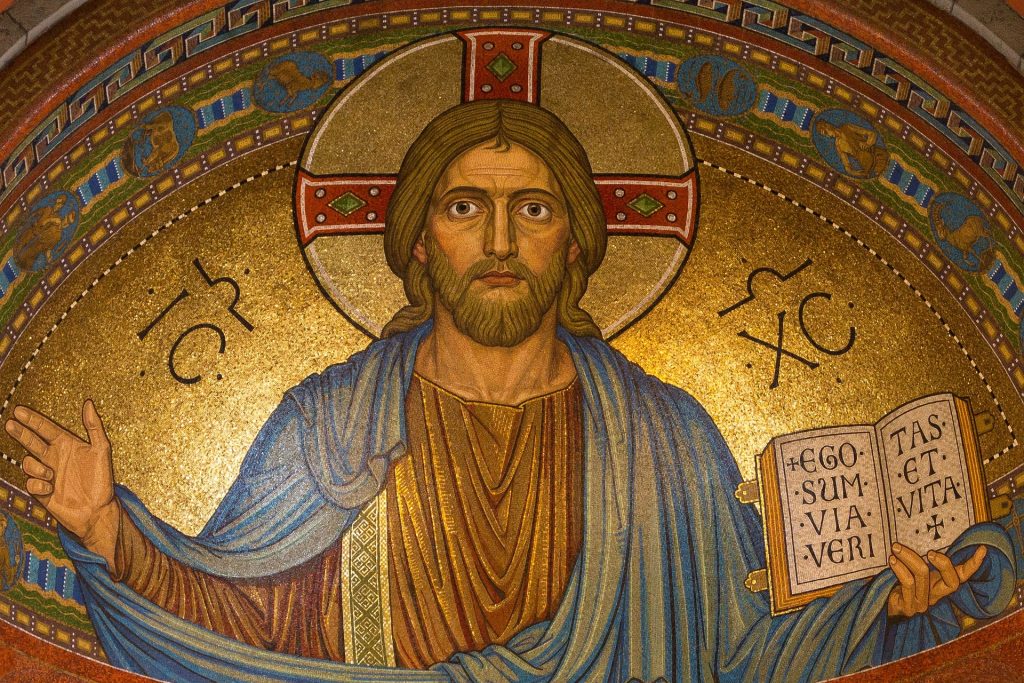
Lent is the journey we take as Catholics to prepare for Easter, the celebration of Christ who has risen from death. Lent starts on Ash Wednesday and lasts the 40 days before Easter, excluding Sundays. We’ve summarised the teaching of Pope Francis about Lent and the victory of Christ’s love to help inspire us on our way…
We prepare by exploring the ‘logic of God’s love’ in our lives. This is done firstly by giving priority to reading and reflecting upon the word of God. As Pope Francis writes in this year’s Lenten Message: “The word of God is alive and powerful, capable of converting hearts and leading them back to God.” Further, that ‘[t]he Lord wants to make use of us as living, free and creative beings who let his word enter their own hearts before then passing it on to others.’ (Evangelii Gaudium n. 151).
A key element of this journey is examining our relationship to poverty. We can an start by considering what the Apostle Paul said of Jesus Christ: “For you know the generous act of our Lord Jesus Christ, that though he was rich, yet for your sakes he became poor, so that by his poverty you might become rich.” This seeming contradiction, Pope Francis explains is a way of loving that ultimately enriches us:
It is his way of loving us, his way of being our neighbour, just as the Good Samaritan was neighbour to the man left half dead by the side of the road (cf. Lk 10:25ff ). What gives us true freedom, true salvation and true happiness is the compassion, tenderness and solidarity of his love (Pope Francis, Lenten Message 2014).
Pope Francis continues in further detail: “Christ’s poverty which enriches us is his taking flesh and bearing our weaknesses and sins as an expression of God’s infinite mercy to us. Christ’s poverty is the greatest treasure of all: Jesus’ wealth is that of his boundless confidence in God the Father, his constant trust, his desire always and only to do the Father’s will and give glory to him. …When Jesus asks us to take up his “yoke which is easy”, he asks us to be enriched by his “poverty which is rich” and his “richness which is poor”, to share his filial and fraternal Spirit, to become sons and daughters in the Son, brothers and sisters in the firstborn brother (cf. Rom 8:29).” (Pope Francis, Lenten Message 2014)
Pope Francis distinguishes between poverty and destitution. Destitution is poverty in the absence of faith, hope or support. He describes three types of destitution, which often arise within the context of unjust life circumstances, and may be symbiotically linked to one another:
- Material destitution. This is what we would usually call ‘poverty’ where people are deprived of shelter, work food or water & hygiene. This deprivation undermines the innate dignity of individuals and prevents them from growing and developing as individuals. “In the poor and outcast we see Christ’s face; by loving and helping the poor, we love and serve Christ. Our efforts are also directed to ending violations of human dignity, discrimination and abuse in the world, for these are so often the cause of destitution.” Pope Francis, Lenten Message 2014
- Moral destitution or slavery to vice and addiction causes much harm to the enslaved individuals and within their families and communities. With moral destitution, individuals become captive to their behaviour, losing freedom and meaning in their lives and reducing their prospects for the future.
- Spiritual destitution is described as existing ‘when we turn away from God and reject his love. If we think we don’t need God who reaches out to us through Christ, because we believe we can make do on our own, we are headed for a fall. God alone can truly save and free us.”
It is through our weakness and vulnerability that God’s love manifests in the world. He is an ongoing, creative force in our lives: “In every time and place God continues to save mankind and the world through the poverty of Christ, who makes himself poor in the sacraments, in his word and in his Church, which is a people of the poor. God’s wealth passes not through our wealth, but invariably and exclusively through our personal and communal poverty, enlivened by the Spirit of Christ” (Pope Francis, Lenten Message 2014)
The special place in God’s heart for the poor necessitates our preferential option for the poor. In Evangelii Gaudium (n. 197 – 201), Pope Francis elaborates on the ‘special place in God’s heart’ for the poor, explaining how we derive from it our principle of the preferential option for the poor and calling our communities to respond to the needs of the poor with insight and creativity:
God shows the poor “his first mercy”. This divine preference has consequences for the faith life of all Christians, since we are called to have “this mind… which was in Jesus Christ” (Phil 2:5). Inspired by this, the Church has made an option for the poor which is understood as a “special form of primacy in the exercise of Christian charity, to which the whole tradition of the Church bears witness”. This option – as Benedict XVI has taught – “is implicit in our Christian faith in a God who became poor for us, so as to enrich us with his poverty”. This is why I want a Church which is poor and for the poor. They have much to teach us. Not only do they share in the sensus fidei, but in their difficulties they know the suffering Christ… We are called to find Christ in them, to lend our voice to their causes, but also to be their friends, to listen to them, to speak for them and to embrace the mysterious wisdom which God wishes to share with us through them… [N]one of us can think we are exempt from concern for the poor and for social justice: “Spiritual conversion, the intensity of the love of God and neighbour, zeal for justice and peace, the Gospel meaning of the poor and of poverty, are required of everyone”. … I ask you to seek, as a community, creative ways of accepting this renewed call.

However, materialism and the love of money can prevent us from preferring an option in favour of the poor. It can prevent us from removing unjust circumstances in our communities. When we prioritise objects, wealth and power above other people’s need we discount their innate dignity and disregard the need to share with them. Pope Francis states: “[t]he Apostle Paul tells us that “the love of money is the root of all evils” (1 Tim 6:10). It is the main cause of corruption and a source of envy, strife and suspicion. Money can come to dominate us, even to the point of becoming a tyrannical idol (cf. Evangelii Gaudium, 55). Instead of being an instrument at our service for doing good and showing solidarity towards others, money can chain us and the entire world to a selfish logic that leaves no room for love and hinders peace.”(Message for Lent 2017)
In the story of the rich man and Lazarus, Pope Francis sees the root problem of the rich man “the failure to heed God’s word. As a result, he no longer loved God and grew to despise his neighbour.” (Message for Lent 2017). According to the Australian Catholic Bishops Conference, “[w]e cannot be at peace, eating our fill, in the knowledge that a sister or brother lies hungry or sick at our gate. We know that such a state of affairs is as far as it can be from the vision of God. Our God is revealed as a God of abundance and hospitality who gives life to the world, bread to the hungry, and Christ as our guide and savior. God in Jesus chooses humility, service and self-emptying as the hallmarks of a love which is everlasting, sumptuous and rich.” (‘Lazarus at Our Gate‘ ACBC Social Justice Statement 2013-2014, p. 12).
According to Pope Paul VI, in order to remove the circumstances that give rise to the suffering of Lazarus, a human community needs to be constructed where “liberty is not an idle word, where the needy Lazarus can sit down with the rich man at the same banquet table. On the part of the rich man, it calls for great generosity, willing sacrifice and diligent effort. Each man must examine his conscience, which sounds a new call in our present times. Is he prepared to support, at his own expense, projects and ,undertakings designed to help the needy? Is he prepared to pay higher taxes so that public authorities may expand their efforts in the work of development? Is he prepared to pay more for imported goods, so that the foreign producer may make a fairer profit? Is he prepared to emigrate from his homeland if necessary and if he is young, in order to help the emerging nations?” Pope Paul VI, (1967) , Encyclical Letter Populorum Progressio (‘On the Development of Peoples’) n. 47.
More often, however, our contentment with our own circumstances can lead us on the path of indifference to the suffering and injustice experience by others: “The result of attachment to money is a sort of blindness. The rich man does not see the poor man who is starving, hurting, lying at his door” (Pope Francis Lenten Message 2017) Moreover, “[o]ur heart grows cold. As long as I am relatively healthy and comfortable, I don’t think about those less well off. Today, this selfish attitude of indifference has taken on global proportions, to the extent that we can speak of a globalization of indifference. It is a problem which we, as Christians, need to confront” (Pope Francis Lenten Message 2015). This indifference is in stark contrast to an example of the preferential option for the poor attributed to Cardinal Oscar Romero: you are watching a house on fire and are concerned for the people inside. When you find out your mother and sister are inside, ‘[y]ou’re attitude changes completely… and you’d do anything to rescue them even at the cost of getting charred. That’s what it means to be truly committed. If we look at poverty from the outside, as if we’re looking at a fire, that’s not to opt for the poor, no matter how concerned we may be. We should get inside as if our own mother and sister were burning. Indeed it’s Christ who is there, hungry and suffering.” Pope Francis warns us about indifference, speaking to us about the need to learn from the experience of the rich man in the biblical story, particularly during Lent: “Indifference to our neighbour and to God also represents a real temptation for us Christians. Each year during Lent we need to hear once more the voice of the prophets who cry out and trouble our conscience” (Pope Francis Lenten Message 2015).
Lent is a journey opening our hearts and bringing us to right relationship with one another: “A right relationship with people consists in gratefully recognizing their value. Even the poor person at the door of the rich is not a nuisance, but a summons to conversion and to change. The parable first invites us to open the doors of our heart to others because each person is a gift, whether it be our neighbour or an anonymous pauper. Lent is a favourable season for opening the doors to all those in need and recognizing in them the face of Christ. Each of us meets people like this every day. Each life that we encounter is a gift deserving acceptance, respect and love. The word of God helps us to open our eyes to welcome and love life, especially when it is weak and vulnerable. But in order to do this, we have to take seriously what the Gospel tells us about the rich man.” (Pope Francis Lenten Message 2017).
-

“I am the way, the truth, and the life.” Above: an image of Christ the Redeemer It is God’s love that triumphs over ‘indifference, hardness of heart and hatred” and it is our experience of that love that gives rise to our lives as Christians: “we can only bear witness to what we ourselves have experienced. Christians are those who let God clothe them with goodness and mercy, with Christ, so as to become, like Christ, servants of God and others (Pope Francis Lenten Message 2015).
It also inspires us to express that faith fully, through the spiritual and corporal works of mercy: “God’s mercy transforms human hearts; it enables us, through the experience of a faithful love, to become merciful in turn. In an ever new miracle, divine mercy shines forth in our lives, inspiring each of us to love our neighbour and to devote ourselves to what the Church’s tradition calls the spiritual and corporal works of mercy. These works remind us that faith finds expression in concrete everyday actions meant to help our neighbours in body and spirit” (Pope Francis, Lenten Message 2016).
Traditionally there are three ways Catholics prepare during this time: prayer; fasting; and almsgiving. Each way brings us an opportunity to make a fresh start and return to a right-relationship with God by
- Deepening our faith and spirituality, particularly through attendance at Mass and receiving the sacrament of the Eucharist;
- Reviewing and simplifying our lives and making changes for the better;
- Sharing our experiences with our family and communities; and
- Taking concrete steps and contribute to a more humane, just world.
Is not this the fast that I choose:
to loose the bonds of injustice,
to undo the thongs of the yoke,
to let the oppressed go free,
and to break every yoke?
Is it not to share your bread with the hungry,
and bring the homeless poor into your house;
when you see the naked, to cover them,
and not to hide yourself from your own kin?
Then your light shall break forth like the dawn,
and your healing shall spring up quickly;
your vindicator shall go before you,
the glory of the Lord shall be your rear guard.
Then you shall call, and the Lord will answer;
you shall cry for help, and he will say, Here I am.
(Isaiah 58: 6-9)
Further links:
Scripture
- Isaiah 58: 6 – 9
- Psalm 51 ‘A Clean heart create in me, O God, and a steadfast spirit renew within me.’
- Joel 2: 12-13
- The Rich Man and Lazarus – Luke 16: 19-31
Lenten Messages of Pope Francis
- Lent 2017: “The Word is a gift. Other persons are a gift”.
- Lent 2016: “I desire mercy, and not sacrifice” (Mt 9:13). The works of mercy on the road of the Jubilee
- Lent 2015: Make your hearts firm (James 5,8)
- Lent 2014: He became poor, so that by his poverty you might become rich (cf. 2 Cor 8:9)
Other documents:
- Find links to Lenten Messages from Emeritus Pope Benedict XVI, Saint John Paul II, and Pope Paul VI at: https://justiceandpeace.org.au/papal-lenten-messages/
- Read about the Corporal and Spiritual Works of Mercy
- ACBC Social Justice Statement 2013-14, ‘Lazarus at Our Gate. A Critical Moment in the Fight Against World Poverty’.
- Saint John Paul II, (1979), Encyclical Letter Redemptor Hominis, n. 9 – 10.
- Pope Paul VI, (1967) , Encyclical Letter Populorum Progressio (‘On the Development of Peoples’)
- Emeritus Pope Benedict (2009) , Papal Encyclical ‘Caritas in Veritate (‘Charity in Truth’) n.22.
- About Laudato Si’ https://justiceandpeace.org.au/9940-2/
- Fasting for Climate: http://catholicearthcare.org.au/2015/06/fasting-for-the-climate/
